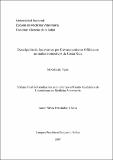| dc.contributor.advisor | Villalobos, Jorge | es_ES |
| dc.contributor.author | Fernández Abarca, Silvia | es_ES |
| dc.date.accessioned | 2016-04-27T14:01:46Z | |
| dc.date.available | 2016-04-27T14:01:46Z | |
| dc.date.created | 2007 | es_ES |
| dc.date.issued | 2007-09-27 | es_ES |
| dc.identifier.uri | http://hdl.handle.net/11056/12892 | |
| dc.description | Modalidad: Tesis | |
| dc.description.abstract | Se estudiaron los principales eventos del accidente ofídico en animales domésticos
de Costa Rica, así como algunas particularidades clínicas que permitieran conocer el
abordaje de las mordeduras por parte de los médicos veterinarios del país.
Se seleccionaron las regiones de Costa Rica que tradicionalmente han presentado la
mayor incidencia de accidentes ofídicos en humanos. Se recolectó la información (por
medio de encuesta) de los casos de envenenamientos ofídicos en animales atendidos por
médicos veterinarios de dichas regiones, en un período de 6 meses. La información se
obtuvo en formularios especialmente diseñados y distribuidos para estos efectos.
La encuesta abarcó para cada animal atendido por mordedura de serpiente, los datos
particulares del paciente, circunstancias del accidente, sintomatología observada, severidad
de la mordedura, tratamiento del emponzoñamiento incluyendo reacciones adversas y
evolución del paciente. Además se indagó sobre la especie de serpiente involucrada en el
accidente y sobre tratamientos empíricos de mordeduras de serpiente practicados por
curanderos.
Se recopilaron 106 casos de mordedura de serpiente en 4 especies de animales
domésticos. En orden decreciente según el número de envenenamientos las especies
afectadas fueron caninos, bovinos, equinos y felinos. La principal serpiente causante de los
accidentes (cuando se pudo identificar) fue la terciopelo (Bothrops asper) con un 62,9%.
En un 25,8% de los casos la serpiente no fue identificada. | es_ES |
| dc.description.abstract | The main aspects of snakebite envenomation in domestic animals in Costa Rica
were studied. Also, the clinical particularities allowing the approach of snake bites by
veterinarians in the country were investigated.
The regions of Costa Rica that traditionally present the highest incidence of ofidic
accidents in humans were selected for this prospective investigation. Information of snake
bites in animals attended by veterinarians in a 6 months period was collected. The
information was obtained by questionnaires especially designed and distributed for this
study.
The survey included for each patient the following information: circumstances of
the accident, clinical signs, severity of the bite, treatment (including adverse reactions and
evolution of the patient), snake involved in the accident and empiric approach of the
poisoning practiced by local people.
A total of 106 cases of snake bite of 4 different domestic animals species were
collected. In decreasing order, according to the number of poisonings , the species affected
were: canine, bovine, equine and felines. The principal snake involved in the bites (when
identified) was terciopelo (Bothrops asper) in 62,9% of the cases. In 25,8% of cases the
snake was not identified. The majority of the cases occurred in the heed and neck, a factor
that may explain the high severity in many cases. | |
| dc.format | application/pdf | es_ES |
| dc.language.iso | es_ES | es_ES |
| dc.publisher | Universidad Nacional, Costa Rica | es_ES |
| dc.rights | Atribución-NoComercial-SinDerivadas 3.0 Costa Rica | es_ES |
| dc.rights.uri | http://creativecommons.org/licenses/by-nc-nd/3.0/cr/ | es_ES |
| dc.subject | ANIMALES DOMESTICOS | es_ES |
| dc.subject | SERPIENTE | es_ES |
| dc.subject | COSTA RICA | es_ES |
| dc.title | Descripción de los eventos por Envenenamiento Ofídico en animales domésticos de Costa Rica | es_ES |
| dc.type | http://purl.org/coar/resource_type/c_7a1f | |
| una.tesis.numero | 5954 | |
| dc.description.procedence | Escuela de Medicina Veterinaria | |


